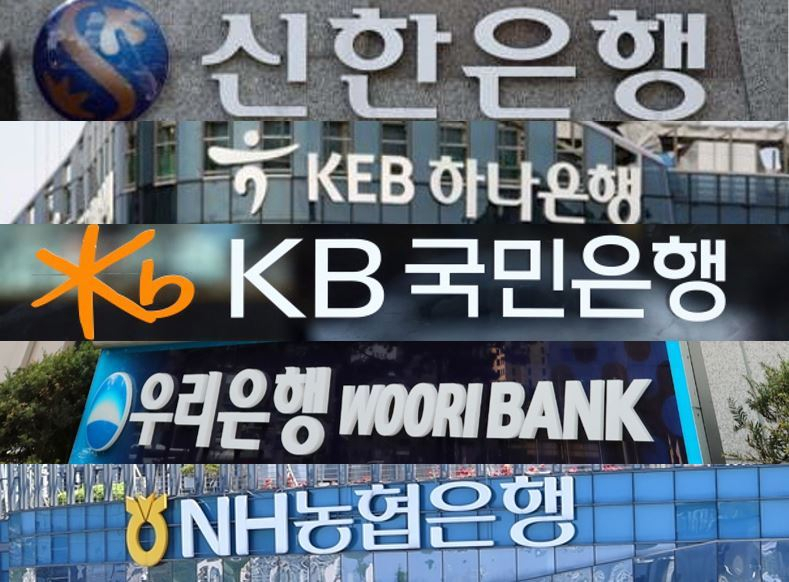 |
Logos of five major commercial banks in South Korea from top: Shinhan, Hana, KB Kookmin, Woori and NongHyup. (Herald DB) |
The top five Korean banks -- KB Kookmin, Shinhan, Hana, Woori and NongHyup – handed out hefty bonuses last year, after they posted record earnings thanks to higher interest income.
The five banks’ bonuses in 2022 amounted to a combined 1.38 trillion won ($1.08 billion), up 35 percent on-year, according to data provided to the Democratic Party of Korea’s Rep. Hwang Un-ha by the Financial Supervisory Service.
The FSS data showed that NongHyup gave out the greatest amount in bonuses -- 670.6 billion won in total -- followed by KB Kookmin, which gave out 204.4 billion won. Shinhan and Hana spent 187.7 billion won and 163.8 billion won, respectively, while Woori spent the least among the five at 155.6 billion won.
Hana had the largest increase in bonuses with a 153.4 billion won jump.
Among the five major commercial banks, one of KB Kookmin’s executives received the largest bonus at some 1.58 billion won. This was 68 times the highest bonus that a non-executive KB Kookmin employee received, which was 23 million won.
Following KB Kookmin, the Hana executive with the biggest bonus took home 358 million won, while the biggest bonuses at Shinhan and Woori were 338 million won and 326 million won, respectively.
The top bonus at NongHyup was 199 million won, the least among the five banks.
Since performance bonuses are usually paid after the performance evaluations of the following year, some industry insiders predict the bonuses of the five major commercial banks this year will be even heftier.
Last week, South Korea’s top four financial groups -- Shinhan, KB, Hana and Woori – saw their combined net profit in 2022 hitting a record high of 15.85 trillion won.
'Bonus party' for 'public good'?
“Banks enjoying a ‘hefty bonus party’ while the majority of the people are struggling with lending interest and household debt occurred due to steep interest rate hikes and inflation. This is an act of betrayal, as an aspect of their operation involves the public,” Rep. Hwang said.
The lawmaker added that banks should share their profits with people especially because they have received assistance from public funds when they were faced with financial difficulties.
The representative was referring to the 1997 Asian financial crisis. A total of 168 trillion won of taxpayers' money was injected into the local financial sector, including commercial banks, in a bid to bring the country’s faltering financial system back to normal.
President Yoon Suk Yeol also strongly criticized bank executives and employees enjoying large bonuses, referring to the lenders as a “public good” on Monday.
“Since banks have the characteristics of public goods, it is appropriate for them to share their profits with people experiencing difficulties or small business owners,” Yoon said.
The president also said it is important for the banks to have solid reserves in preparation for future financial market instability, and asked financial watchdogs to find a way to stop banks from holding the "bonus party."
However, many experts and industry insiders counter that banks are private firms with shareholders, and should not be considered the equivalent to a public good even if they hold some social responsibility.
"We are already contributing to society in diverse ways like making donations, investments into financial technology startups and so on," an industry insider who declined to be named said. "This kind of government involvement can also affect foreign investors. Korean banks will become less appealing to them."
"I can say with certainty that no economic textbook in the world cites banks as an example of a public good," Seoul National University economics professor Lee Joon-koo said in a post on the university’s website. He explained that public goods should have two key characteristics -- nonexcludable and nonrivalrous -- which do not apply to banks.







